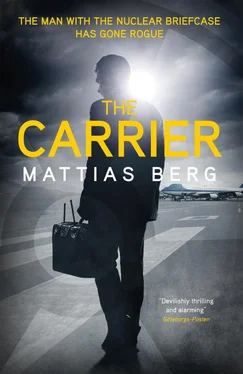Mattias Berg - The Carrier
Здесь есть возможность читать онлайн «Mattias Berg - The Carrier» весь текст электронной книги совершенно бесплатно (целиком полную версию без сокращений). В некоторых случаях можно слушать аудио, скачать через торрент в формате fb2 и присутствует краткое содержание. Город: London, Год выпуска: 2019, ISBN: 2019, Издательство: MacLehose Press, Жанр: Триллер, на английском языке. Описание произведения, (предисловие) а так же отзывы посетителей доступны на портале библиотеки ЛибКат.
- Название:The Carrier
- Автор:
- Издательство:MacLehose Press
- Жанр:
- Год:2019
- Город:London
- ISBN:978-0-85705-788-4
- Рейтинг книги:4 / 5. Голосов: 1
-
Избранное:Добавить в избранное
- Отзывы:
-
Ваша оценка:
- 80
- 1
- 2
- 3
- 4
- 5
The Carrier: краткое содержание, описание и аннотация
Предлагаем к чтению аннотацию, описание, краткое содержание или предисловие (зависит от того, что написал сам автор книги «The Carrier»). Если вы не нашли необходимую информацию о книге — напишите в комментариях, мы постараемся отыскать её.
The Carrier — читать онлайн бесплатно полную книгу (весь текст) целиком
Ниже представлен текст книги, разбитый по страницам. Система сохранения места последней прочитанной страницы, позволяет с удобством читать онлайн бесплатно книгу «The Carrier», без необходимости каждый раз заново искать на чём Вы остановились. Поставьте закладку, и сможете в любой момент перейти на страницу, на которой закончили чтение.
Интервал:
Закладка:
The final image was not a map but a manipulated photograph. It represented the whole of enemy territory as one single smoking, radioactive, stony desert. Across the picture was a single line, in vivid yellow capital letters: “THE SOVIET UNION, 1917–54. R.I.P.”
Then I pressed the button, transforming simulation into reality. A calm warmth spread through my body.
6.11
I was woken up by my cell phone. A Swedish number, one that I did not recognize. After a while I decided to answer—just as the caller rang off.
Waiting for a message to be left, I looked at my wrist-watch. Time 02.31, indoor temperature 82.2. The mattress was soaked with sweat in the stifling scirocco heat. I thought about opening a window, but there was no catch to hold it. The wind would immediately have smashed the cracked pane against the wall.
I listened, looked, and listened again, but no message came into my voicemail. Ingrid was sitting at the kitchen table, turned away from me, with the costume make-up spread out over the wax tablecloth. The light of the moon was so strong that she needed no lamp. Its bluish sheen tinged the whole apartment in a new tone, with the whining of the wind as an eerie backdrop of sound.
“Who was that?” she said, without turning around.
“I’ve no idea.”
I got up from the mattress, showed her the cell phone, the numbers still on the display.
“That’s Aina,” she said.
“What would she want with me? And no message either…”
“Women of our generation don’t like leaving them, you know. Or what was on her mind was something she didn’t feel like recording. Why don’t you call her, my treasure?”
When I pressed the green button, the recall function, I tried to picture Aina lying there alone on a February night in Ursvik. How Sixten might have just left her and started to make his way down here. Having heard the news from Crimea last night and understood the significance. How Aina might not have been able to get any sleep in his rare absence. Staring out of her window at the snowdrifts—before picking up the phone at last, and choosing me to call.
I called back, but pressed the red button before she answered. Did not pick up her next call, or the one after that. Could not really find room for Aina’s anxiety too. For Sixten, for the world—and maybe for us.
Then I laid the cell phone aside, sat down on the other side of the kitchen table and looked at Ingrid’s changing face. How it seemed older with each dab of costume make-up. How she was overtaking her real age, somewhere around seventy if I was to believe her stories. How she placed the Lucia crown on her head, tried it out, grimaced into her pocket mirror.
There is something about the scirocco. In Sicily it is said to be a mitigation for women who kill their husbands under its influence.
“A penny for your thoughts, Erasmus.”
She turned to me in the pale blue-light of the moon, this suddenly aged woman. Or perhaps it was my own imagination which made her look different. It was as if I too were feeling the effects of the scirocco, its faintly occult power, the bewitching wind which ripped and tore at the shutters.
“None at all, Ingrid. Not a single one,” I said.
She let her gaze dwell on me, waiting. Then filled my silence.
“I spotted you immediately, my treasure, already during that first lecture. Saw your full potential. And now it’s time for your exam. We two against the world.”
Ingrid got up, put on her pack. Passed the hybrid to me: I accepted it without a word. Looked at my wrist-watch. At 04.00, the witching hour, we left our safe house for the last time. Swapping some sort of security for a fundamental uncertainty. Not only for us, but for the whole of mankind.
Once we were outside, my watch showed 75 degrees, in the middle of the night, February 22. My cheeks began to glow as I followed Ingrid along a new path in the shelter of the mountains, below the ridge, hidden from the moon—much quicker than the calm miles during my evening runs. The weight of the hybrid was distributed equally between my back and stomach, thanks to Jesús María’s genius. There was not a cloud in the sky and the light was magical. I looked up, into space, experienced the weight and lightness of the moment. Felt like a reed in the warm strong wind, a mere insect, a dwarf spider. Shivered again despite the temperature.
Once we had come some way into the ravine, Ingrid forked off due south, through a small cleft leading to the durum fields which ran gently down to the sea. It was of course only a diversion. The sort of thing that people like us did without even thinking, as synchronized now as in Kiruna. Then she found her way back to our original course, a classic zigzag, adapted to the natural obstacles of the mountain.
Soon our pace was down below 8.3 minutes per mile, even with the hot south-east wind directly in our faces. Ingrid was always in the lead, the “Destroyer of the Universe” coursing through the illuminated landscape. Since the full moon was like a spotlight, keeping close to the lee of the mountains, we sought out shadows.
In the hollow down near the M.U.O.S. base itself—where we could, for the first time, make out the enormous antennae, the topography having concealed them until then—we paused. Drank, ate one crunch cookie each, checked our surroundings from the shelter of the last small olive grove above the facility. Gazed at the anarchic mass of people and tents, which left very little open space on the vast, steppe-like slope below us.
This area alone must have been nearly four square miles in size, 2470 acres, the equivalent of almost two thousand football fields. It had of course been strategically correct to put the base here. So as not to risk being hemmed in by any form of attack, as could have been the case in a bowl between the mountains. It had allowed us to hold frequent joint maneuvers of air and ground forces on a larger scale. Have the space to really roll out the foot soldiers. Sometimes entire divisions with tens of thousands of infantrymen, rehearsing chaotic combat operations with drones hovering overhead.
But the enormous open space in front of the base also offered a perfect gathering place for activists. And even if half a million of them were to turn up here for the inauguration today, at this remote corner of the island, they would still have twenty-one square feet of ground apiece.
Not as many as that had come, at least not yet. But the distinctive noise of the mass—a roar of whistles, songs and chanted slogans, both in unison and dissonant—could be heard clearly all the way up in our olive grove, about a half a mile away, even though it was not yet 5.00 a.m. In all likelihood none of them would have slept that night. Just stayed awake and watchful, let the jungle drums sound out, after having picked up the same news that Ingrid received on her portable command terminal. That the inauguration would take place some time during the coming day. That the authorities believed the peace movement too would be focusing on Crimea, on “Cold War 2.0”, and not this place. Which seemed a gross misjudgment given the number of activists who had gathered around the base.
The first activists must have been in place for days and nights, maybe even weeks. In the sharp light of the full moon we could see that the tent villages had a permanent look about them, seemed fully established, homely in a chaotic way, with swim-wear and towels hung out to dry, their dots slowly climbing up the surrounding slopes. At regular intervals, delighted little cries even penetrated the mass when the scirocco gusted across the slope before the base, making the camps in their entirety shiver, the costumes flutter.
When Edelweiss held his special presentations we had often expressed surprise at the tactical thinking—or rather the lack of it—of the peace activists. But he made it clear that it was not a matter of short-term tactics but rather of a long-term strategy. That for them it was at least as important just to be seen, to shape opinion and stimulate debate, as it was to make their way into the base unseen.
Читать дальшеИнтервал:
Закладка:
Похожие книги на «The Carrier»
Представляем Вашему вниманию похожие книги на «The Carrier» списком для выбора. Мы отобрали схожую по названию и смыслу литературу в надежде предоставить читателям больше вариантов отыскать новые, интересные, ещё непрочитанные произведения.
Обсуждение, отзывы о книге «The Carrier» и просто собственные мнения читателей. Оставьте ваши комментарии, напишите, что Вы думаете о произведении, его смысле или главных героях. Укажите что конкретно понравилось, а что нет, и почему Вы так считаете.












